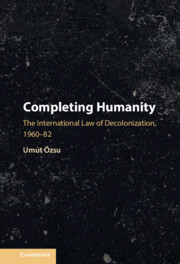Book contents
- Completing Humanity
- Completing Humanity
- Copyright page
- Dedication
- Epigraph
- Contents
- Acknowledgements
- Note on Terminology and Translations
- Table of Cases
- Table of Treaties and Other Instruments
- Table of Resolutions
- Table of Domestic Statutes
- Abbreviations
- Introduction
- 1 Fixing Selves
- 2 Forging Universals
- 3 Redistributing Resources
- 4 Pooling Rights
- 5 Righting Markets
- Conclusion
- Bibliography
- Index
3 - Redistributing Resources
Published online by Cambridge University Press: 16 January 2024
- Completing Humanity
- Completing Humanity
- Copyright page
- Dedication
- Epigraph
- Contents
- Acknowledgements
- Note on Terminology and Translations
- Table of Cases
- Table of Treaties and Other Instruments
- Table of Resolutions
- Table of Domestic Statutes
- Abbreviations
- Introduction
- 1 Fixing Selves
- 2 Forging Universals
- 3 Redistributing Resources
- 4 Pooling Rights
- 5 Righting Markets
- Conclusion
- Bibliography
- Index
Summary
This chapter considers the concept of permanent sovereignty over natural resources as articulated in the New International Economic Order (NIEO) project. At the NIEO’s core was the push to consolidate the legal status of ‘permanent sovereignty’ over natural resources. This idea’s champions argued that ownership and control of resources is an essential and necessary element of statehood, one that involves the right to nationalize foreign-held property. By contrast, its critics contended that no state could lawfully seize assets of foreign investors without compensation. They also insisted that the quantity of such compensation should be determined by international law, or through international arbitration, in the event of disagreement. While most aspects of the NIEO, including resource sovereignty, had been debated for some time, partly during broader discussions of neocolonialism and uneven development within the UN Conference on Trade and Development, it was only in 1974 that the project was formalized in a set of General Assembly resolutions. This project was largely the expression of a desire on the part of political and legal elites in the global South to renegotiate their roles in the world capitalist system, reforming rather than repudiating the existing international order.
Keywords
- Type
- Chapter
- Information
- Completing HumanityThe International Law of Decolonization, 1960–82, pp. 104 - 155Publisher: Cambridge University PressPrint publication year: 2023

